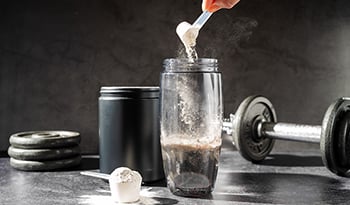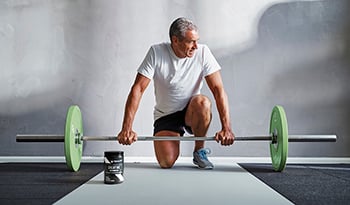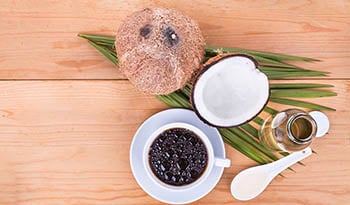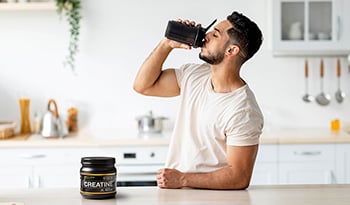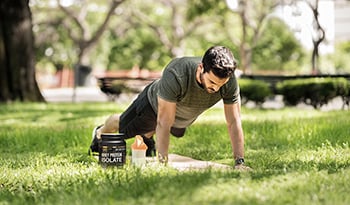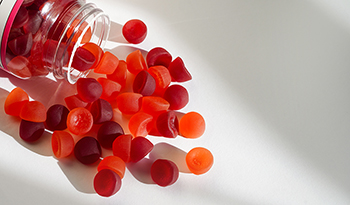Bästa träningstillskott: Muskeltillväxt, energi, återhämtning, + Mer
Viktiga tips
Bästa träningstillskott i korthet:
- För muskelökning + styrka: Kreatinmonohydrat, vassleprotein
- För energi + prestation: Rödbetapulver
- För återhämtning: surkörsbär, BCAA
- För allmän hälsa: En kvalitets multivitamin
Vad är träningstillskott?
Oavsett vilken sport eller träning, träningstillskott kan förbättra förmågan att prestera, uthärda och återhämta sig. Träningstillskott, även känd som sportnäring, är en stor kategori som innehåller populära kosttillskott som proteinpulver, grenade aminosyror (BCAA), kreatin, testosteronförstärkare och många fler. Dessa träningstillskott är populära eftersom de fungerar, och idrottare och fitnessentusiaster älskar deras fördelar.
Varför ta träningstillskott?
Det finns tre primära mål ur ett tillskottsperspektiv för att hjälpa till att få ut mesta möjliga av träning:
- Ge omfattande näringsstöd till tränade muskler
- Förbättra energinivåer och prestation under träning
- Främja muskeltillväxt, återhämtning och reparation efter träning
Kosttillskott för muskeltillväxt
Protein
Muskler behöver tillräckligt med protein för att förbättra muskeltillväxt och reparation. För idrottare är doseringsrekommendationen ett totalt proteinintag på cirka 2,2 gram protein för varje kilo kroppsvikt. Förutom att äta en diet fokuserad på livsmedel med högt protein, är tillskott med proteinpulver som basingrediens i högproteinsmoothies ett enkelt sätt att öka proteinintaget.
Vassle, äggvita, kasein och andra mjölkproteinkoncentrat är proteinpulver av högsta kvalitet. Vassleprotein har det högsta biologiska värdet av alla proteiner. Biologiskt värde används för att betygsätta protein baserat på hur mycket av det konsumerade proteinet absorberas, behålls och används i kroppen.
En av de viktigaste anledningarna till att vassleproteinets biologiska värde är så högt är att det har de högsta koncentrationerna av glutamin och grenkedjiga aminosyror (BCAA) som finns i naturen. Dessa aminosyror är avgörande för cellulär hälsa, muskeltillväxt och proteinsyntes.5
Veganska proteinkällor är inte lika höga i essentiella aminosyror eller BCAA. De bättre veganska proteinpulvren består av sojaproteinisolat, ärtprotein, spirulina och pumpafröprotein. Veganska proteinpulver från ris, solrosfrö, lin, chia, hampa och sacha inchi är lägre i proteinkvalitet, vilket innebär att högre doser skulle vara nödvändiga för att tillgodose proteinbehov från dessa källor. Veganska proteinpulver ger andra fördelaktiga föreningar utöver protein, inklusive kostfiber, vitaminer, mineraler och fytokemikalier.
Här är några riktlinjer för användning av proteinpulver för att komplettera proteinintaget hos idrottare:
- För de som ägnar sig åt måttliga nivåer av styrka eller uthållighetsträning, 20 till 40 g dagligen.
- För dem som ägnar sig åt intensiv styrka- eller uthållighetsträning och de som vill bygga muskelmassa behövs ett totalt proteinintag på ungefär 2 gram per kg kroppsvikt. Att ta 20 till 40 g proteinpulver två gånger dagligen går långt för att möta detta ökade behov.
Veganer som vill bygga muskler bör överväga att komplettera sitt intag av protein ytterligare genom att ta ett BCAA-tillskott i en dos av 3 till 5 g per dag.
Kollagen
Kollagenpeptider och benbuljongproteiner är ofullständiga eftersom de praktiskt taget inte har tryptofan. Men när dessa proteinkällor införlivas i ett typiskt proteinintag i kosten, är de också utmärkta proteintillskott.6 Kollagenpeptider ger några ytterligare fördelar jämfört med andra proteinpulver eftersom de har visat sig stödja led- och benhälsa.
Pre-workout-tillskott
Pre workout
De mest populära energiförbättrande pre-workout-tillskotten har koffein. Betydande vetenskapliga bevis visar att koffein har värde för att öka träningsprestation, oavsett om det är uthållighetsträning eller de aktiviteter som kräver explosiva kraftinsatser, som sprint eller tyngdlyftning. Koffein fungerar bäst när det tas 15 till 60 minuter före träningen; doserna är vanligtvis mellan 200 och 400 mg.7,8
Kreatin
Kreatin är ett annat populärt pre workout-tillskott, men forskning tyder på att ta det efter träning kan ge något bättre resultat. Kreatin används främst som en del av träningsrutinen för att öka styrka och muskler. Det fungerar genom att öka muskelenerginivåerna, vilket gör att idrottare kan arbeta lite hårdare under styrketräning. Och den extra ansträngningen är det som verkligen stimulerar muskeltillväxt. Kreatin förbättrar också muskelproteinsyntesen, så det förbättrar muskelbyggande effekten av intensiv ansträngning. Den vanliga dagliga doseringsrekommendationen är 5 till 10 gram. Vissa experter rekommenderar 1 gram kreatin för varje 25 kg kroppsvikt. Så, om en person vägde 75 kg (160 pund), skulle dosen vara 3 gram dagligen.9
Återhämtningstillskott
BCAA
De bästa kosttillskotten för att hjälpa till med muskeltillväxt, återhämtning och reparation är de som innehåller de tre essentiella grenade aminosyrorna (BCAA) valin, leucin och isoleucin. BCAA: erna är viktiga för muskelmetabolism och står för ungefär 15% av aminosyrahalten i mänsklig skelettmuskel. En av de viktigaste fördelarna med BCAA är att de hjälper mitokondrier i energiproduktion under träning, vilket hjälper till att förhindra både mental och fysisk trötthet under träning. Detta gör BCAA också till en populär ingrediens före träning såväl som efter träning.
BCAA finns som isolerade aminosyror i förhållandet 2:1:1 – två delar leucin, en del isoleucin och en del valin. Vassleprotein är också rikt på BCAA. En av fördelarna med rena BCAA-tillskott jämfört med ett proteinpulver före eller efter träning är att de är mindre benägna att orsaka illamående eller magirritation. Den allmänna rekommenderade dosen för BCAA är 100 mg per kg kroppsvikt per dag.
BCAA-tillskott kan förbättra muskeltillväxtresponsen från träning10 och hjälpa till att bekämpa trötthet, men en av deras viktigaste fördelar är att hantera muskelömhet efter träning och i synnerhet fördröjd träningsvärk (DOMS) som uppstår en eller två dagar efter ett träningspass.11,12 DOMS beror på små muskelskador som leder till inflammation. Och DOMS kan inte bara vara smärtsamt, utan det kan också minska muskelstyrkan och rörelseomfånget.
Klinisk forskning på människor visar att intag av BCAA-tillskott före eller efter träning kan minska träningsvärk och skador. När muskelceller skadas läcker cellerna ett enzym som kallas kreatinkinas (CK) ut i blodet, vilket gör det till en markör för muskelinflammation. BCAA-tillskott har visat sig avsevärt sänka CK-nivåerna efter träning, vilket indikerar mindre muskelskador från träning och en minskad risk för DOMS.
Surkörsbärsextrakt
En 500 mg daglig dos av surkörsbärsextrakt (Montmorency) rikt på polyfenoler har visat sig minska oxidativ stress och muskelskador efter träning och hjälpa till med träningsåterhämtning. Ytterligare fördelar med surkörsbär är att det är en naturlig källa till melatonin, och det har visat sig förbättra sömnkvaliteten i kliniska studier på människor.
Bästa träningstillskottet totalt sett: Rödbetor
Den kanske bästa supermaten för idrottare är regelbunden konsumtion av rödbetasaft eller pulver på grund av det höga innehållet av nitrater och växtpigmentet betalain, som är ansvarigt för den mörkröda färgen. Medan mycket av den kliniska forskningen har gjorts med rödbetasaft, har Rödbetapulver framstått som ett fantastiskt sätt att fånga alla närings- och hälsofördelar med betasaft på ett bekvämt sätt.
Konsumtion av rödbetasaft eller pulver ökar produktionen av föreningen kväveoxid, vilket hjälper till att förbättra blodflödet. Denna fördel leder till förbättrad tillförsel av syre och näringsämnen till musklerna samt avlägsnande av koldioxid och cellulära avfallsprodukter. Detta förklarar den betydande vetenskapliga forskningen som visar fördelarna med rödbetasaft eller rödbetapulver på träning, muskelstyrka och uthållighet och återhämtning efter träning.13
Tillskott kan också förbättra övergripande fysisk prestation och hjärtfunktion under träning. Rödbetor är till hjälp för att förbättra uthållighetsträningsprestation såväl som högintensiv träningsprestanda som involverar explosiva rörelser som tyngdlyftning eller sprint.14,15 Resultat från en systematisk granskning visade att i 4 av de 10 sprinttypstudierna förbättrade rödbetstillskott sprinttid och effekt. I tyngdlyftningsstudierna visade 4 av de 10 studierna förbättringar i kraft och hastighet för fri vikt och isokinetiska övningar.
Rödbetor kan också öka träningsrelaterad återhämtning och hjälpa till med snabbare styrkaåterhämtning och en minskning av smärta, inflammation och muskelskador efter träning. Enligt en metaanalys av sex dubbelblinda, kontrollerade studier förhindrar rödbetor också DOMS (fördröjd muskelsmärta).16,17
De flesta studier använde dagliga doser av rödbetasaft mellan 70 och 250 ml, och de bästa resultaten sågs när man tog minst 140 ml rödbetasaft i mer än 14 dagar och tog det mellan 1-3 timmar före träning för att dra nytta av högsta nitratnivåer i blodet. Dosen för rödbetapulver bör approximera denna nivå. Det finns variation i kvalitet i rödbetapulver, och doseringen kommer att variera därefter.
Grundläggande stöd för aktiva individer
Multivitaminer
Att ta en multipel vitamin- och mineralformel som ger det rekommenderade kostintaget av dessa viktiga näringsämnen ger en mycket bra näringsförsäkring för att stödja kroppen före, under och efter träning.
Träning ökar muskelmetabolismen, vilket ger en ökad efterfrågan på många näringsämnen. Näringsämnen som är särskilt viktiga för idrottare är de som är involverade i energimetabolismen, särskilt B-vitaminerna och mineraler som kalcium, magnesiumoch järn.
Järn
Järn är särskilt viktigt för kvinnliga idrottare i fertil ålder på grund av järnförlust under menstruationen. Låga järnnivåer är förknippade med signifikant minskad fysisk energi och är en av de lättast omvända orsakerna till dålig fysisk prestation och trötthet. Järnbrist är mycket vanligt hos kvinnliga idrottare. En studie av kvinnliga tävlingssimmare fann bevis på brist hos 80% av kvinnorna. Andra studier har funnit järnbrist hos 30-60% av kvinnliga idrottare. Det kräver en dos på 120 till 180 mg dagligen för att förhindra järnbrist.1,2
För att avgöra om en kvinna behöver järn utförs ett blodprov som kallas serumferritin. Det mäter kroppens järnförråd. Helst bör nivån vara minst 60 ng/ml. De mest populära järntillskotten är järnsulfat och järnfumarat. De bästa formerna verkar dock vara järnbisglycinat och järnpyrofosfat. Båda är fria från gastrointestinala biverkningar och har en högre relativ biotillgänglighet, särskilt om de tas på fastande mage.
Magnesium
Ett annat mineral som ofta är avgörande för idrottare är magnesium. RDI (rekommenderat dagligt intag) är 420 mg för män och 320 mg för kvinnor. Eftersom det genomsnittliga magnesiumintaget av friska vuxna i USA varierar från 143 till 266 mg/dag, får de flesta i USA bara ungefär hälften av det magnesium som deras kroppar behöver. Om magnesiumnivåerna är låga är det ett stort problem för idrottare eftersom magnesium är involverat i mer än 300 biokemiska reaktioner i människokroppen, inklusive aktivering av många enzymer, reglering av koncentrationsnivåerna av andra viktiga näringsämnen och optimal funktion av celler i hela kroppen, särskilt muskel- och hjärnceller. Låga magnesiumnivåer hos idrottare kan resultera i mindre uthållighet, muskelkramper och dålig återhämtning.
För bästa resultat bör magnesiumtillskott tas på kvällen för att dra nytta av magnesiumets förmåga att främja övergripande avslappning och vilsam sömn.3,4 Mycket absorberbara former av magnesium, som magnesiumcitrat, malat eller bisglycinat, rekommenderas i en dos av 250 till 300 mg vid sänggåendet.
ZMA
Ett annat populärt alternativ är att ta magnesium med zink och vitamin B6, populärt kallat ett ZMA-tillskott. B6 och zink hjälper magnesium med celltillväxt, vävnadsreparation och ett hälsosamt immunsystem.
Vanliga frågor (FAQ)
Behöver jag ta träningstillskott?
Nej, de är inte nödvändiga. En solid näringsplan och konsekvent träning är de viktigaste faktorerna. Kosttillskott kan hjälpa till att optimera resultaten, men ersätter inte grunderna.
Vilka är de ”stora tre” träningstillskotten för en nybörjare?
För de flesta nybörjare är de mest effektiva och väl undersökta kosttillskotten proteinpulver, kreatinmonohydrat och en pre-workout med koffein.
Är träningstillskott säkra?
När de köps från ett välrenommerat varumärke och tas enligt anvisningarna är de listade kosttillskotten i allmänhet säkra för friska vuxna. Rådgör alltid med din läkare innan du börjar med ett nytt tillskott.
Referenser:
- Coad J, Conlon C. Järnbrist hos kvinnor: bedömning, orsaker och konsekvenser. Curr Opin Clin Nutr Metab Care. 2011 nov; 14 (6): 625-34.
- McClung JP. Järnstatus och den kvinnliga idrottaren. J Trace Elem Med Biol. 2012 juni; 26 (2-3): 124-6.
- Boyle NB, Lawton C, Dye L. Effekterna av magnesiumtillskott på subjektiv ångest och stress - En systematisk granskning. Näringsämnen. 2017 april 26; 9 (5): 429.
- Abbasi B, Kimiagar M, Sadeghniiat K, et al. Effekten av magnesiumtillskott på primär sömnlöshet hos äldre: En dubbelblind placebokontrollerad klinisk prövning. J Res Med Sci. 2012 december; 17 (12): 1161-9.
- Li M, Liu F. Effekt av vassleproteintillskott under motståndsträningssessioner på kroppsmassa och muskelstyrka: en metaanalys. Livsmedelsfunktion. 2019 maj 22; 10 (5): 2766-2773.
- Paul C, Leser S, Oesser S. Betydande mängder av funktionella kollagenpeptider kan införlivas i kosten samtidigt som oumbärlig aminosyrabalans upprätthålls. Näringsämnen. 2019 maj 15; 11 (5): 1079.
- Ganio MS; Klau JF; Casa DJ; et al. Effekt av koffein på sportspecifik uthållighetsprestanda; en systematisk översyn. J Styrkekonditionering Res 2009; 23:315 —324.
- Goldstein ER; Ziegenfuss T.; Kalman D.; et al. International Society of Sports Nutrition Position Stand: koffein och prestanda. J Int Soc Sports Nutr 2010; 7:5 —20.
- Kreider RB, Kalman DS, Antonio J, m.fl. International Society of Sports Nutrition ställningsställning: säkerhet och effekt av kreatintillskott i träning, sport och medicin. J Int Soc Sports Nutr. 2017; 14:18.
- Plotkin DL, Delcastillo K, Van Every DW, Tipton KD, Aragon AA, Schoenfeld BJ. Isolerat leucin och grenad aminosyratillskott för att förbättra muskelstyrka och hypertrofi: En berättande recension. Internationell tidskrift för sportnäring och träningsmetabolism. 2021; 31 (3): 292-301.
- Khemtong C, Kuo CH, Chen CY, Jaime SJ, Condello G. Dämpar tillskott av grenade aminosyror (BCAA) muskelskador och ömhet efter motståndsträning hos tränade män? En metaanalys av randomiserade kontrollerade studier. Näringsämnen. 2021 maj 31; 13 (6) :1880.
- Fedewa MV, Spencer SO, Williams TD, Becker ZE, Fuqua CA. Effekt av grenkedjiga aminosyratillskott på muskelömhet efter träning: En metaanalys. Int J Vitam Nutr Res. 2019 november; 89 (5-6): 348-356.
- Evangelista JF, Meirelles CM, Aguiar GS, Alves R, Matsuura C. Effekter av rödbetsbaserade kosttillskott på muskulär uthållighet och styrka hos friska manliga individer: En systematisk granskning och metaanalys. J Am Nutr Assoc. 2023 Maj 11:1-15.
- Cermak NM, Gibala MJ, van Loon LJ. Nitrattillskott förbättrar 10 km tidsprövningsprestanda hos tränade cyklister. Int J Sport Nutr Exerc-Metab. 2012 feb; 22 (1): 64-71.
- Tan R, Cano L, Lago-Rodríguez Á, Domínguez R. Effekterna av kosttillskott av nitrat på explosiv träningsprestanda: En systematisk översyn. Int J Environ Res folkhälsa. 2022 jan 11; 19 (2): 762.
- Gamonales JM, Rojas-Valverde D, Muñoz-Jiménez J, Serrano-Moreno W, Ibanez SJ. Effektiviteten av nitratintag vid återhämtning från träningsrelaterad trötthet: En systematisk översyn. Int J Environ Res folkhälsa. 2022 sep 23; 19 (19): 12021.
- Jones L, Bailey SJ, Rowland SN, m.fl. Effekten av nitratrik rödbetasaft på markörer för träningsinducerad muskelskada: En systematisk granskning och metaanalys av mänskliga interventionsförsök. J Diet Suppl. 2022; 19 (6): 749-771.
ANSVARSFRISKRIVNING:Denna Wellness Hub avser inte att tillhandahålla diagnos ...
















































































 Innehållsförteckning
Innehållsförteckning





